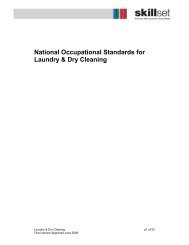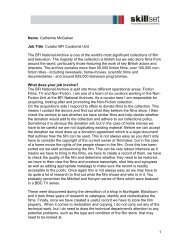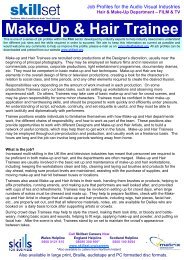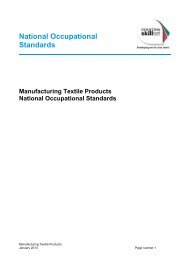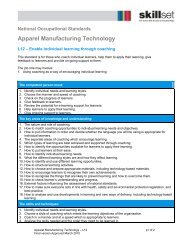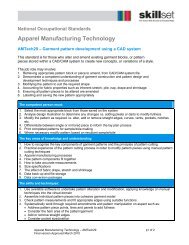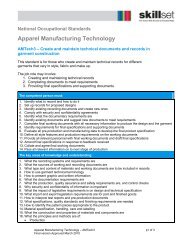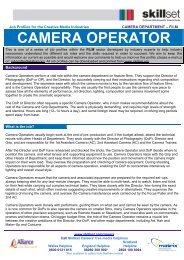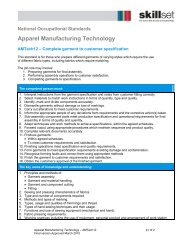CAREER PROFILE CLOTHING ALTERATION HAND - Skillset
CAREER PROFILE CLOTHING ALTERATION HAND - Skillset
CAREER PROFILE CLOTHING ALTERATION HAND - Skillset
Create successful ePaper yourself
Turn your PDF publications into a flip-book with our unique Google optimized e-Paper software.
Garment technologists<br />
support the design and<br />
buying team through all<br />
stages of garment product<br />
development, from<br />
design to manufacture.<br />
Garment technologists<br />
can be employed by<br />
manufacturers or large,<br />
high-street retailers.<br />
What does a garment<br />
technologist do<br />
The garment technologist would be<br />
involved in choosing an appropriate<br />
fabric and design, which will be<br />
in budget. They would then work<br />
with the pattern graders to oversee<br />
the sizing, fitting and testing of the<br />
pre-production garments. A garment<br />
technologist would also analyse<br />
product returns and faults.<br />
The salary of a<br />
garment technologist<br />
A garment technologist may be paid<br />
between £15,000 and £18,000 a<br />
year when starting out. This could<br />
increase to around £25,000 a year<br />
with experience. Senior garment<br />
technologists can earn around<br />
£50,000 a year.<br />
Hours and working environment<br />
A garment technologist would<br />
typically work around 38 hours<br />
a week, this can increase during<br />
busy times and when deadlines<br />
have to be met.<br />
For the majority of the time, a<br />
garment technologist is office-based<br />
and the job can involve working<br />
in a design studio. A garment<br />
technologist may be required to<br />
travel for work, both within the<br />
UK and overseas.<br />
Skills and interests<br />
It may be useful for someone<br />
considering a career in garment<br />
technology to have some of the<br />
following skills and interests:<br />
* an understanding of manufacturing<br />
processes and textile properties<br />
*<br />
*<br />
the ability to work well alone<br />
or as part of a team<br />
the ability to work under pressure<br />
and to tight deadlines<br />
For more information visit<br />
www.skillfast-uk.org/generationf<br />
Entry into a career in<br />
garment technology<br />
A relevant degree is usually preferred<br />
on entry to this industry. Relevant<br />
degrees are available in clothing<br />
technology and production from<br />
a number of universities, visit the<br />
UCAS website: www.ucas.com<br />
for more information.<br />
Work experience is also a good<br />
way of gaining experience of the<br />
industry and making contacts.<br />
Further training to develop a<br />
career in garment technology<br />
On-the-job development of practical<br />
knowledge and skills is critical<br />
to this role. Experience and skills<br />
development will lead to promotion<br />
opportunities.<br />
Short and part-time courses are<br />
also available which may be suitable<br />
for those already working in the<br />
industry. Other qualifications<br />
are available from ABC awards,<br />
visit www.abcawards.co.uk<br />
The Textile Institute also covers<br />
the apparel industry and offers<br />
a range of qualifications, for<br />
more information see the website:<br />
www.texi.org<br />
Opportunities in the field<br />
of garment technology<br />
Graduates will usually join a<br />
company in a junior role, working<br />
their way up through the areas<br />
of product development, quality<br />
control or buying before becoming<br />
a garment technologist.<br />
With experience, it may be possible<br />
to gain promotion into more senior<br />
positions, such as senior technologist<br />
or technical manager. It may also<br />
be possible for a senior garment<br />
technologist to progress into a role<br />
in research within a university or<br />
similar institution.<br />
Case study<br />
Peter Capewell has<br />
worked for Simon Jersey,<br />
a leading corporate<br />
and workwear specialist<br />
based near Accrington,<br />
for two years as a<br />
garment technologist.<br />
Peter started his career as<br />
a pattern cutter working<br />
for numerous companies<br />
including a bespoke tailor<br />
and a mail order company.<br />
He has taken a variety of<br />
qualifications to develop<br />
his skills and gain a better<br />
understanding of fabrics<br />
and garment construction.<br />
Peter had some great<br />
mentors over the years<br />
that encouraged his<br />
development and provided<br />
him with experience to move<br />
into garment technology.<br />
Peter says “Having worked<br />
extensively with a variety<br />
of products means I have<br />
a great deal of knowledge<br />
and understanding of<br />
garment construction which<br />
is essential for my job.”<br />
Team working with the<br />
textile technologist and<br />
pattern cutter ensures the<br />
best product is made for<br />
the customer and allows<br />
maximum creativity.<br />
Peter’s job has allowed<br />
for extensive travel as<br />
many fabrics and finished<br />
garments are made now<br />
overseas. Peter says “Good<br />
all round knowledge of<br />
clothing and fabrics makes<br />
my job easier especially<br />
when working with overseas<br />
companies but seeing a new<br />
product developed from<br />
start to finish is fantastic.”



